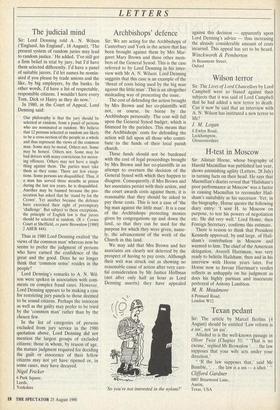LETTERS The judicial mind
Sir: Lord Denning told A.. N. Wilson (England, his England', 18 August), 'The present system of random juries may lead to random justice.' He added, 'I've still got a firm belief in trial by jury, but I'd have them selected differently. I'd have a panel of suitable jurors. I'd let names be nomin- ated if you please by trade unions and the like, by big employers, by the banks. In other words, I'd have a list of respectable, responsible citizens. I wouldn't have every Tom, Dick or Harry as they do now.'
In 1980, in the Court of Appeal, Lord Denning said:
Our philosophy is that the jury should be selected at random, from a panel of persons who are nominated at random. We believe that 12 persons selected at random are likely to be a cross-section of the people as a whole and thus represent the views of the common man. Some may be moral. Others not. Some may be honest. Others not. Some may be bad drivers with many convictions for motor- ing offences. Others may not have a single thing against them. The parties must take them as they come. There are few excep- tions. Some persons are disqualified. Thus, if a man has served three months in prison during the last ten years, he is disqualified. Another may be banned because the pro- secution has asked that he 'stand by for the Crown'. Yet another because the defence have exercised their right of peremptory 'challenge'. But subject to these exceptions, the principle of English law is that jurors should be selected at random. (R v. Crown Court at Sheffield, ex pane Brownlow [1980] 2 AIIER 444).
Thus in 1980 Lord Denning exalted 'the views of the common man' whereas now he seems to prefer the judgment of persons who have earned the confidence of the great and the good. Does he no longer think that 'common sense' resides in the people?
Lord Denning's remarks to A. N. Wil- son were spoken in association with com- ments on complex fraud cases. However, Lord Denning appears to be making a case for restricting jury panels to those deemed to be sound citizens. Perhaps the innocent as well as the guilty may prefer to be tried by the 'common man' rather than by the chosen few.
In the list of categories of persons excluded from jury service in the 1980 quotation above, Lord Denning did not mention the largest groups of excluded citizens: those in whom, by reason of age, the mature judgment required for deciding the guilt or innocence of their fellow citizens may not yet have ripened or, in some cases, may have decayed.
Nigel Fricker
6 Park Square, Leeds, Yorkshire










































 Previous page
Previous page